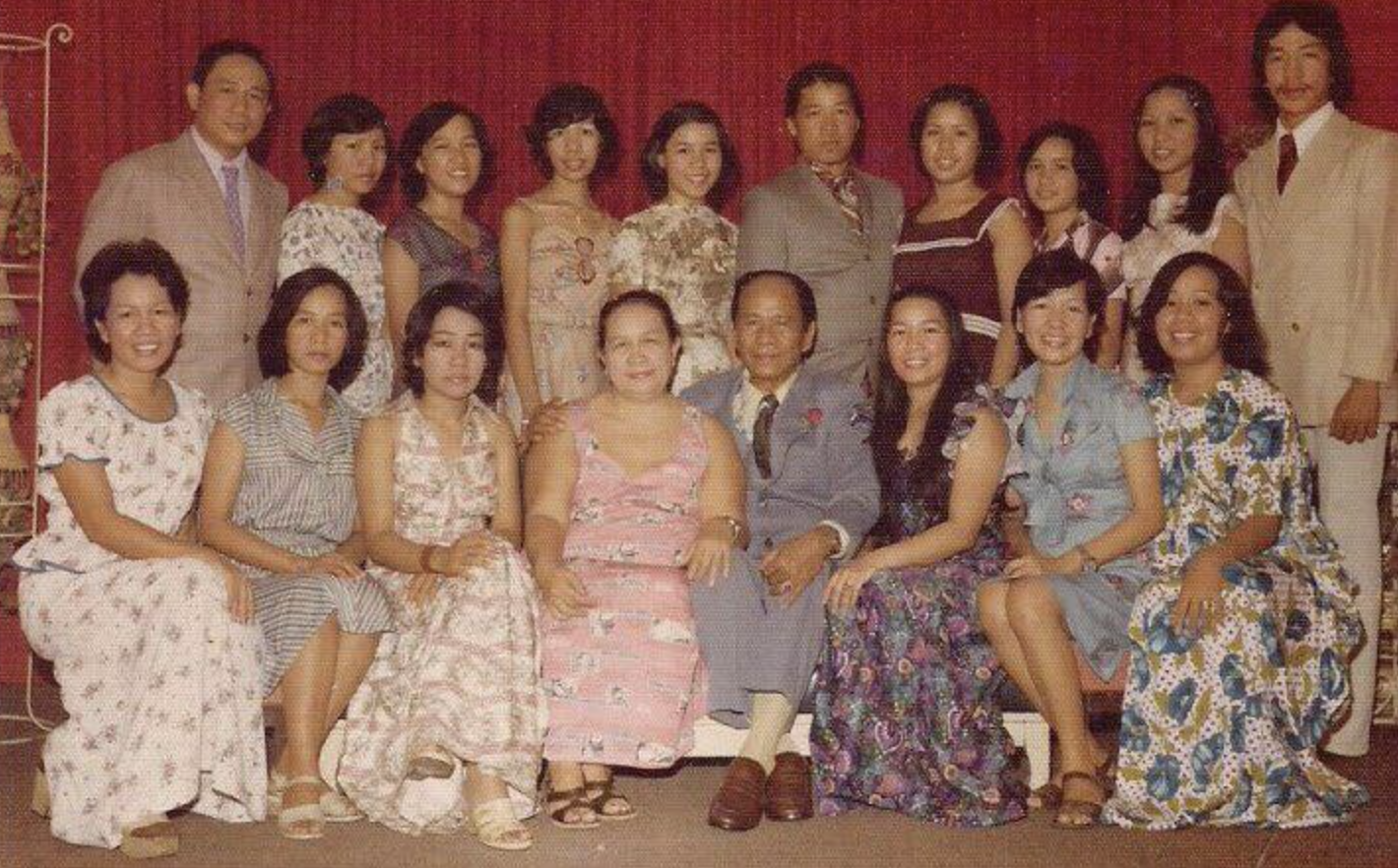The glue that held our family together: A family's journey in caring for its matron

My name is Virgina Lorilla, but my maiden name is Virginia Lobaton. I was born in the Philippines and I grew up there. I migrated to the United States in 1981, so I think I was 23 or 24 or around that time.
I am a nurse. I have been working as a Director of Nurses in a nursing home, so geriatrics is my specialty. Other than that from time to time, I would do some consultation, but all my life I’ve been a nurse. I think back in the 80s when I first worked in nursing homes that was when I was first introduced to dementia. In our school during my training, we didn’t put much emphasis on dementia. It was just nursing, surgical cases, probably pediatrics, but we didn’t have any gerontology courses in our classes then. My first introduction to dementia would have been here in America. And at that time back in the 80s, we had a couple of people, old people, geriatric people, who were a bit confused, but there was really no formal training for dementia care or formal training towards understanding the subject.
My mother Honey Lobaton was first diagnosed, but actually there was no formal diagnosis prior to us noticing some changes. I think she was around the early 70s or somewhere around the mid 70s. We saw a change in her behavior, she seemed to be more aggressive. There had been some episodes where she was experiencing auditory hallucinations and she would hear babies crying and tended to be more forgetful and repetitive. We all thought it was just due to “being old.” So we didn’t really put much thought into it as she was still able to function pretty well. I think earlier than that when her and dad were still staying in their own apartment, now when I look back to it, that was a little bit weird. She started hoarding things like sodas and she would keep them in those big garbage cans with covers, which were clean but she would just keep it there. And she would go shopping and divide it into small bags and she was really proud of that. Mamang wasn’t very active but she liked cooking and that’s all she did. I think later around 70 or middle 70, that is when she started hoarding as well. I think overtime when mom started getting more dependent and her behavior changed as well.
In the beginning it was easy to just bring her things and bring her food she was used to, food that she liked and that was no problem. But over time, she needed more attention being that she was becoming more repetitive and her condition was also complicated with her arthritis, she had a knee replacement. In the beginning it was also easy to converse with mom, it was easy to redirect her, but over time as she was getting more and more forgetful and her condition being complicated with rheumatoid arthritis she was becoming more dependent. We had to tend her physical needs as well, toileting and feeding. She needed to be coached because a lot of time she is forgetting how to eat. Cleaning, daily bathing her, and changing her was an ordeal because she would fight with us and she would scratch since her behavior had changed. Prior to that, earlier like I said we didn’t really see those subtle changes. As I look back at that behavior change. One time she came home in the Philippines and she was visiting my sister and my sister was just a little bit late in opening the gate and that made her so angry and she basically beat up my sister with her cane and that alerted us. So after we were always afraid for my father’s safety as well because there was no impulse control with her. She would get mad easily and she was more sensitive. We would say something that we’re joking, but with her she had a different perception of it.
I think most of the misunderstandings we had amongst our siblings was because some of the siblings did not fully comprehend the severity of her cognitive impairment. So they still believed and sympathized with mamang and refused to see the other side. That created some big conflicts within us siblings, but we love mamang dearly. It was a hard time. It was a struggle because the family was divided and I would say most of the siblings who were nurses were on my side and those non-medical were on the other side. It was really a terrible time because there was grief where we couldn’t be altogether as a family anymore. We had to take turns borrowing mom, but those are things that we went through. I think when we finally got the diagnosis of Alzheimer’s, mom was really deteriorating which was in 2006 and papang passed away. She was alone back in the Philippines so we decided to bring her back over here, because she was bed bound and no one in the Philippines really understood Alzheimer’s. They thought that mom was just making up all this behavior, so I decided that it was best to bring her back here. Her condition wasn't looking good given the fact that her prognosis was she had diabetes and other issues. I had the power of attorney and I talked with my sisters about end of life. There were still some misunderstandings in the family so I decided to bring in a family member from the Alzheimer's Association. She came in and we invited her to speak with the rest of the family. I think that was really the best thing I’ve done because it wasn’t just another professional but also a family member who had also gone through this illness with her own family member. And that really helped everyone accept mom’s situation and be understanding and be supportive of me.
I think we are blessed in that we have a very big family. You know in our culture our elders always hold a high position in our hierarchy. Even the in-laws and grandchildren, I really admire and I am grateful to them for how they rallied around the family to attend to mamang. In her debilitated state and bedridden, yet she had gone with us to Tahoe and came with us to camping. So that was only made possible because we have big guys pulling together and carrying mom up and down the stairs. Mom was that glue that held us altogether and all the “apos” the grandchildren, the grand grand apos, which was just so wonderful. They all had that high respect for their grandma.
I wish I could have done more. I think sometimes there were times where I felt guilty, because at the time mom was with me and I was still working full time. I did hire somebody to stay with mom during the daytime. It was hard to find someone who you could really trust. You want to make sure she gets everything. How I wished I could have provided mom with a nice room, but since she can’t go up I had to do a makeshift room downstairs. I don’t think I ever felt myself resenting her, but guilt because I really wanted to personally take care of mom but I couldn’t. So I did my best, as much as I can with the caregiver’s help. I think I was very grateful for my husband was very supportive. And he being a nurse he was a really big help and changing mom. But you know as mamang as she was deteriorating mentally she needed more stimulation, and that was something that I really could not provide. And looking back I told my sisters I think we were more selfish in wanting to keep mom home because we feel we can do a better job at taking care of her and I believe that. However, like most families here we have to work and provide for our families so as much as we wanted it there was not enough time. So I feel like we deprived mom of the mental and social stimulation that she really needed.
I felt that if she had the opportunity like probably if we placed her in a nursing home she would have probably flourished. And nowadays because I worked and working in a couple of nursing homes around here and there are a lot of Filipino workers there and I know how they care. And a lot of times when they know it’s a Filipino family, they really do pay attention. But I think because of our culture we really want to take care of our old people at home. But yes that is a regret for me because I worked in a nursing home and we had an Alzheimer's unit and the programs there were geared toward their specific needs and they flourished and did well. Mom would have probably done well in that environment. Because yes she was at home, but during the daytime I was not there. She is with another caregiver and I don’t know what that caregiver is doing, but that caregiver can not really relate to mamang about her past. Which again as her Dementia’s was progressing and her Alzheimer’s was progressing she was going back to when she was a little girl. And a stranger can not talk to her in that respect. If ever I have the opportunity to speak with Filipino families, I would say I think they need to get over that guilt and they need to think more about the resident.
